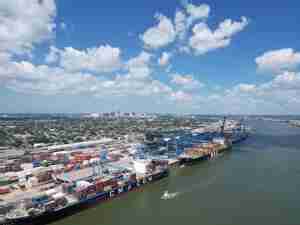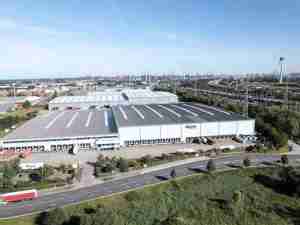Hans Smits, Port of Rotterdam Authority CEO: “Considering the circumstances, we cannot be dissatisfied. After hitting rock bottom in the second quarter, throughput has been improving slightly every month and virtually all the investments are going ahead. Moreover, Rotterdam is doing better than its main rivals. But I am not unconcerned. Many of our clients are having a difficult time and that will not be much different in 2010. The best medicine for this is growth, partly through an increase in our market shares. We therefore intend to continue with our active commercial policy. As a result of this, among other things, I hope that we will be able to break through the 400 million tonne barrier again next year. That means growth in throughput considerably over 3%”.
Dry bulk
The total quantity of dry bulk handled was down by 29% to 67 million tonnes.
The quantity of coal handled fell to 25 million tonnes. In the first few months of the year, coal imports remained reasonably stable due to the cold winter, ongoing contracts and the effects of trade. After the winter, energy consumption fell in both the Netherlands and Germany and coal’s share declined more strongly than that of the other energy sources. Throughput of cokes coal, about 40% of coal imports into Rotterdam, reflected the plummeting steel production. With the recovering economy and a mine closure in Germany, modest growth in coal throughput is expected in 2010.
Ore and scrap throughput almost halved (-47%,) to 23 million tonnes. Falling demand for steel led to the temporary closure of many blast furnaces in Northwest Europe and a dramatic decline in the handling of ore. Most of the blast furnaces have started operating again, but under capacity. In 2010, the utilisation rate can be increased to 80%. As a result, ore imports could increase to a possible 30 million tonnes.
Other dry bulk was 13% down, to just over 10 million tonnes. The main consumers in this sector, the chemical and metal industry, are suffering from the economic crisis. The decline is still being compensated for to some extent by the gradual export of a few million tonnes of asphalt from a storage facility in the port area. Without this incidental flow, but with slightly increasing demand for minerals, ores and concentrates, throughput figures for other dry bulk could end up at 9 million tonnes next year.
The handling of agribulk (grains, oil seeds, derivatives) fell sharply: - 22% to just over 8 million tonnes. Europe had a good 2008-2009 harvest. As a result, fewer imports from overseas were necessary. In Rotterdam, the accent is on imports. In addition to this, imports were influenced negatively by a ban on genetically modified maize and reduced milk production. Due to the low milk prices, farmers used more grass and hay and less - imported - oil seeds.
Liquid bulk
The volume of liquid bulk handled rose by 1% to 196 million tonnes. Imports of crude oil fell by close on 6% to 95 million tonnes. Demand for oil products was down and refining margins fell, as a result of which it became unavoidable to limit production. In comparison with other regions, however, Rotterdam did noticeably better thanks to the strength of the petrochemical cluster. This and the anticipated increase in the refining margins counterbalance the high commodity stocks and the slow increase in demand in the









